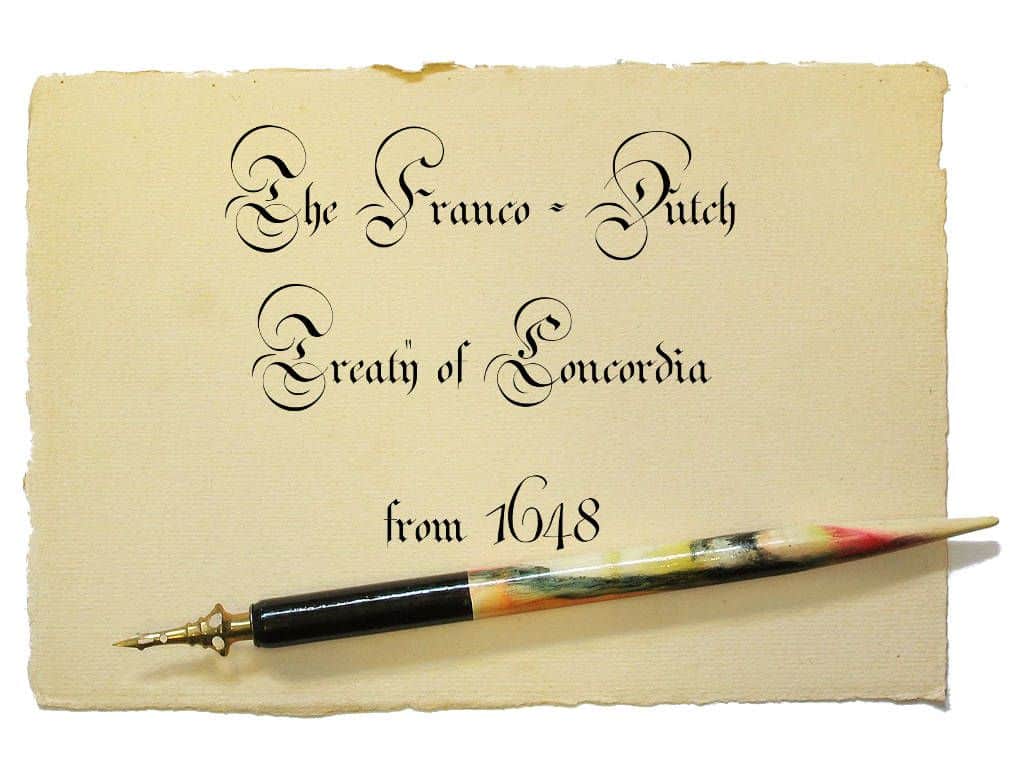The Treaty of Concordia is the oldest international treaty, which is still being enforced. Below is the original text:
Treaty of Concordia
(a.k.a. The Partition Treaty of 1648) by which French and Dutch settlers agreed that the peoples of St.Martin shall coexist in a cooperative manner:
Today, the 23rd of March 1648, have assembled Robert de Lonvillliers, Knight and Lord of this place, Governor of the island of St.Maarten, on behalf of his Most Christian Majesty (i.e. the King of France) and Martin Thomas, likewise Governor of the said island, on behalf of the Prince of Orange and the States General of Holland, and Henri de Lonvilliers, Lord of Benevent, Savin and Courpon,, Chevalier, Lord of La Tour, lieutenant -colonel of the island, and David Coppins, Lieutenant of a Dutch company, and Pitre van Zeun Hus (Pieter van Zevenhuizen?), likewise Lieutenant of a company of the above mentioned, who, on either side, have agreed upon the following:
1. that the French shall continue in that quarter where they are established at this present, and that they shall inhabit the entire coast (actually: side) which faces Anguilla;
2. that the Dutch shall have the quarter of the fort, and the soil surrounding it on the south coast;
3. that the French and Dutch established on the said island shall live as friends and allies, and that, in case of either party molesting the other, this shall constitute an infringement of this treaty, and shall therefore be punishable by the laws of war;
4. that, if a Frenchman or Dutchman being guilty of a criminal act or an infringement of this agreement, or of disobedience to the commands of his superiors, or of whatever other remissness, shall withdraw to the territory of the other nation, the contracting parties shall be bound to cause such person to be arrested in their territory, and to deliver him up to his Governor on the latter's first requesting it;
5. that the chase, the fisheries, the salt pans, the rivers, the lakes, the fresh waters, the dye-wood, mines and minerals, harbours and roadsteads, and other commodities of the said island shall be common, and shall serve to provide the wants of the inhabitants;
6. that it shall be permitted to French persons at this present residing with the Dutch to join the French , if it so please them, and to take with their movables, foodstuffs and money and other commodities, provided they shall have settled their debts or given sufficient security, and that the Dutch shall be able to do like-wise and on the same conditions;
7. that, if enemies should attack one part or the other, the parties to this treaty shall be obliged to render each other aid and assistance;
8. that the delimitation and partition of the said island between the two nations shall be submitted to the General of the French and the Governor of St. Eustatius, and to the deputies that shall be sent to visit the places; and that, their report having been made, they shall delimit their quarters, and proceed in the manner stipulated above;
9. that any claims one party may have against the other shall be submitted to the King of France and the gentlemen of His Council, and to the Prince of Orange and the States of Holland. Neither of the above parties shall be able to construct fortifications without contravening the above agreement and compensations with respect to the other party.
Given on the date heretofore mentioned, on the mountain surnamed des Accords ( Concordia) of the said island, and signed by the said gentlemen, in the presence of Bernard de la Fond, Knight and Lord of Esperance, Lieutenant of a French Company on St. Christophe.






